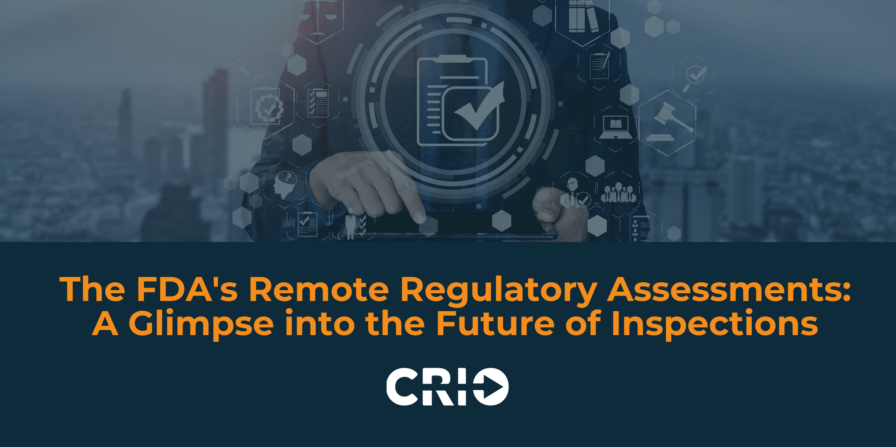The FDA’s Remote Regulatory Assessments: A Glimpse into the Future of Inspections

COVID-19 has fundamentally changed how clinical trials are conducted. In May 2021, FDA developed the ‘Resiliency Roadmap for FDA Inspectional Oversight’. In this document, FDA identified and embraced technological advancements by incorporating remote regulatory assessments (RRAs) into its inspection repertoire. During the pandemic, at a time where travel was restricted and personal contact heavily discouraged, RRAs became a mechanism that allowed FDA work to continue by leveraging tools that are now a mainstay: namely video conferencing, file sharing, and remote access.
In an agency update in November of 2021, FDA announced that it completed over 600 domestic and over 200 foreign RRAs. Further, FDA noted that over 100 of them were voluntary RRAs.
The success of RRAs became evident and the agency established the FDA Inspectional Affairs Council (FIAC) in July 2021. One of the top initial priorities identified by FIAC members is to develop an enterprise-wide policy and procedure for the use of Remote Regulatory Assessments. The guidance released in January is a direct result of this effort.
What are RRAs?
RRAs are essentially virtual examinations of facilities and their records, conducted entirely remotely to assess compliance with FDA regulations. This shift offers several advantages, including:
- Enhanced efficiency and flexibility: RRAs can be conducted more quickly and at lower cost compared to traditional on-site inspections, allowing the FDA to cover more ground and prioritize critical areas.
- Reduced travel and disruption: Both FDA investigators and industry personnel save time and resources by eliminating the need for physical travel.
- Improved global reach: RRAs facilitate oversight of facilities located overseas, ensuring consistent compliance standards across the globe.
Are Inspections and RRAs the same?
No, an inspection, such as described in section 704(a)(1) of the FD&C Act, involves duly designated officers or employees of the FDA physically entering (at reasonable times and in a reasonable manner), establishments subject to regulation under the FD&C Act to determine compliance with applicable requirements.
Also, FDA does not intend to issue form FDA 482 Notice of Inspection or form FDA 483 Inspectional Observations during the RRA process.
Are RAAs Mandatory?
FDA can conduct mandatory or voluntary RAAs. Below is a brief breakdown of the two:
- Voluntary RRAs:
- Participation is optional: You can choose whether or not to participate in these assessments.
- No penalties for declining: Declining won’t trigger any enforcement actions from the FDA.
- Faster review: Can be a quicker way for the FDA to assess your activities, especially if an on-site inspection is delayed.
- Useful when travel or other factors limit inspections: Can bridge the gap when in-person visits are difficult.
- Mandatory RRAs:
- Participation is required: You cannot opt out of these assessments if the FDA requests one.
- Consequences for non-compliance: Refusing to participate, withdraw, or provide requested records can lead to violations of the FD&C Act and potential penalties.
- Focus on specific information: Typically target specific records or information the FDA needs to fulfill their oversight responsibilities.
Key takeaway: Voluntary RRAs offer flexibility and potential benefits, while mandatory RRAs involve legal obligations and potential consequences for non-compliance.
However, preparing for an RRA requires a different approach compared to traditional inspections. Here are some key steps to ensure a smooth and successful assessment:
- Familiarize yourself with the FDA’s RRA guidance: The FDA has issued a draft guidance document outlining the scope, procedures, and expectations for RRAs. Thoroughly understanding this document is crucial for proper preparation.
- Assess your technological infrastructure: While technological expectations will vary depending on the type of RRA and its scope, ensuring that you have reliable video conferencing tools, document sharing platforms, and the necessary bandwidth available to support a seamless remote assessment is a key element to a successful RRA. Systems with read-only access – such as CRIO’s allow for a truly seamless RRA experience for FDA staff.
- Organize and readily access relevant records: Have all requested documents readily available electronically or in easily retrievable hard copies. This includes electronic records, standard operating procedures, and any other documents relevant to the scope of the RRA. In general, the records and other information will typically be similar to what FDA would request during an inspection.
- Designate knowledgeable subject matter experts (SMEs): Identify and prepare individuals with in-depth knowledge of your processes and procedures to answer questions and address any concerns raised by the FDA investigators during the RRA.
- Conduct mock RRAs: Simulate the RRA process internally to identify potential gaps and areas for improvement. This practice run will help your team feel more confident and prepared for the actual assessment.
- Maintain open communication: Foster clear and consistent communication with the FDA throughout the RRA process. Address any questions or concerns promptly and proactively.
How can CRIO help?
By leveraging CRIO, sites, CROs and sponsors streamline document management. CRIO organizes source data and other relevant trial documents in one central location, making them readily accessible to the FDA during RRAs.
Dedicated read-only user roles provide real-time data visibility. The FDA can remotely access real-time data and reports, painting a comprehensive picture of the trial’s progress.
By capturing all data in electronic format, stakeholders can reduce their reliance on physical records. This eliminates the need for physical document transportation and review, saving time and resources for all parties involved.
In Summary, below are the benefits for sites, CROs and Sponsors that use CRIO:
- Reduce the burden of preparing for RRAs: By streamlining data access, communication, and reporting, electronic systems, such as CRIO, significantly reduce the workload for sponsors and investigators during RRAs.
- Increase the likelihood of a successful RRA: Improved data visibility, communication, and transparency enhance the quality and efficiency of the assessment process, increasing the chances of a smooth and successful RRA.
- Demonstrate compliance and data integrity: Electronic systems that meet Good Clinical Practice and 21 CFR Part 11 requirements ensure data integrity and internationally-recognized compliance within the clinical trials industry.
By leveraging CRIO, clinical trial sites, CROs and sponsors can significantly enhance their preparedness for FDA remote regulatory assessments, ultimately contributing to smoother, more efficient, and successful interactions with the agency.




